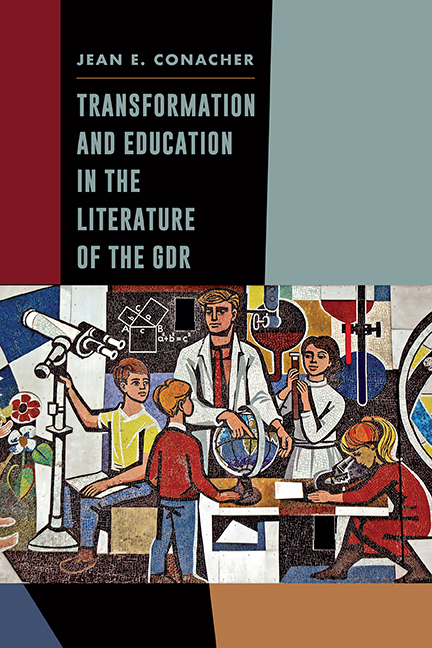Book contents
- Frontmatter
- Dedication
- Contents
- List of Illustrations
- Acknowledgments
- List of Abbreviations
- Introduction: The Postwar Desire for Renewal
- 1 Shaping the Cultural and Educational Landscape in the Soviet Occupation Zone (SBZ)
- 2 Interweaving GDR Education and Cultural Policy toward a National Literature
- 3 Critiquing the Norm in Steinmann' Die größere Liebe, Wolf' Der geteilte Himmel, and Kant' Die Aula
- 4 “Ich bin. Wer?“: Subjectivity and Transformation in Wolf' Nachdenken über Christa T. and Reimann' Franziska Linkerhand
- 5 “Wem geben wir Einsen … ?” Meritocracies and Reward in de Bruyn' Die Preisverleihung and Plenzdorf' Die neuen Leiden des jungen W.
- 6 “Mir geht es gut”: Challenging Stagnation in Hein' Der fremde Freund and H�ntsch' Wir sind keine Kinder mehr
- Conclusion
- Appendix A Text-Internal Functions of Narrative Triangle (Left Side)
- Appendix B Text-External Functions of Narrative Triangle (Right Side)
- Notes
- Bibliography
- Index
Introduction: The Postwar Desire for Renewal
Published online by Cambridge University Press: 25 March 2020
- Frontmatter
- Dedication
- Contents
- List of Illustrations
- Acknowledgments
- List of Abbreviations
- Introduction: The Postwar Desire for Renewal
- 1 Shaping the Cultural and Educational Landscape in the Soviet Occupation Zone (SBZ)
- 2 Interweaving GDR Education and Cultural Policy toward a National Literature
- 3 Critiquing the Norm in Steinmann' Die größere Liebe, Wolf' Der geteilte Himmel, and Kant' Die Aula
- 4 “Ich bin. Wer?“: Subjectivity and Transformation in Wolf' Nachdenken über Christa T. and Reimann' Franziska Linkerhand
- 5 “Wem geben wir Einsen … ?” Meritocracies and Reward in de Bruyn' Die Preisverleihung and Plenzdorf' Die neuen Leiden des jungen W.
- 6 “Mir geht es gut”: Challenging Stagnation in Hein' Der fremde Freund and H�ntsch' Wir sind keine Kinder mehr
- Conclusion
- Appendix A Text-Internal Functions of Narrative Triangle (Left Side)
- Appendix B Text-External Functions of Narrative Triangle (Right Side)
- Notes
- Bibliography
- Index
Summary
AT NO OTHER TIME in the history of the German-speaking world have the public roles of teacher and writer, the official realms of education and literature, been more inextricably and more explicitly interlinked than during the forty-year history of the German Democratic Republic (GDR). In particular, the first two decades of the country's existence constituted, in the words of Hannes Krauss, an “einzigartige[r] literaturpädagogische[r] Großversuch.” Leading cultural politicians—many, like Johannes R. Becher, Anna Seghers, and Willi Bredel, well-established writers returning from exile—publicly, positively, and, it seemed, wholeheartedly promoted the integration of literary form, content, and message in their common educational and cultural mission to help the German population in 1945 understand the wrongs of the Nazi past and commit to a democratic and peaceful future for Germany in Europe.
Any interpretation of this immediate postwar period as a “Stunde Null,” a problematic concept explored more fully by Stephen Brockmann, was officially rejected from the outset by the Soviet Occupation Zone (Sowjetische Besatzungszone, or SBZ), from which the GDR emerged in 1949. Instead, in the early years, writers, artists, educationalists, and politicians actively pursued a common strategy of positive atonement, encouraging an active acknowledgment of past mistakes while fostering a sense of continuity between Germany's pre-Nazi past and the new state's future. The first aim was to establish a cultural legitimacy for the new state by proving it capable of recovering and upholding Germany’s cultural heritage. The second was to integrate cultural and educational policy into broader political agendas, thus tying writers and artists into the overall democratic—and later socialist—cause. The third was to promote the development of a national utopia capable of sustaining citizens through the hardships of the postwar years. This positive shared approach contrasted sharply with developments in the Federal Republic, where, as Brockmann highlights, “writers like Langgässer, Benn, Böll, and Koeppen tended to take a sceptical, critical, and even hostile attitude towards West German rebuilding and explicitly saw themselves as outsiders and nonconformists.”
Producing challenging literature was not, however, the preserve of the West. It was inevitable that East German writers would also engage critically with their own pedagogical and artistic role in the implementation of cultural policies that largely prioritized the thematic treatment of emerging socialist citizens within “the better Germany” and sought to impose constraints on writers’ selection of form and style to achieve that ideological end.
- Type
- Chapter
- Information
- Publisher: Boydell & BrewerPrint publication year: 2020

